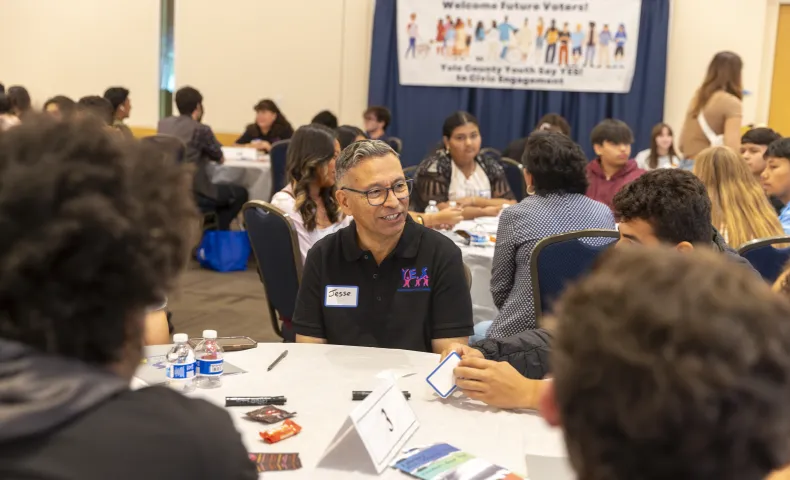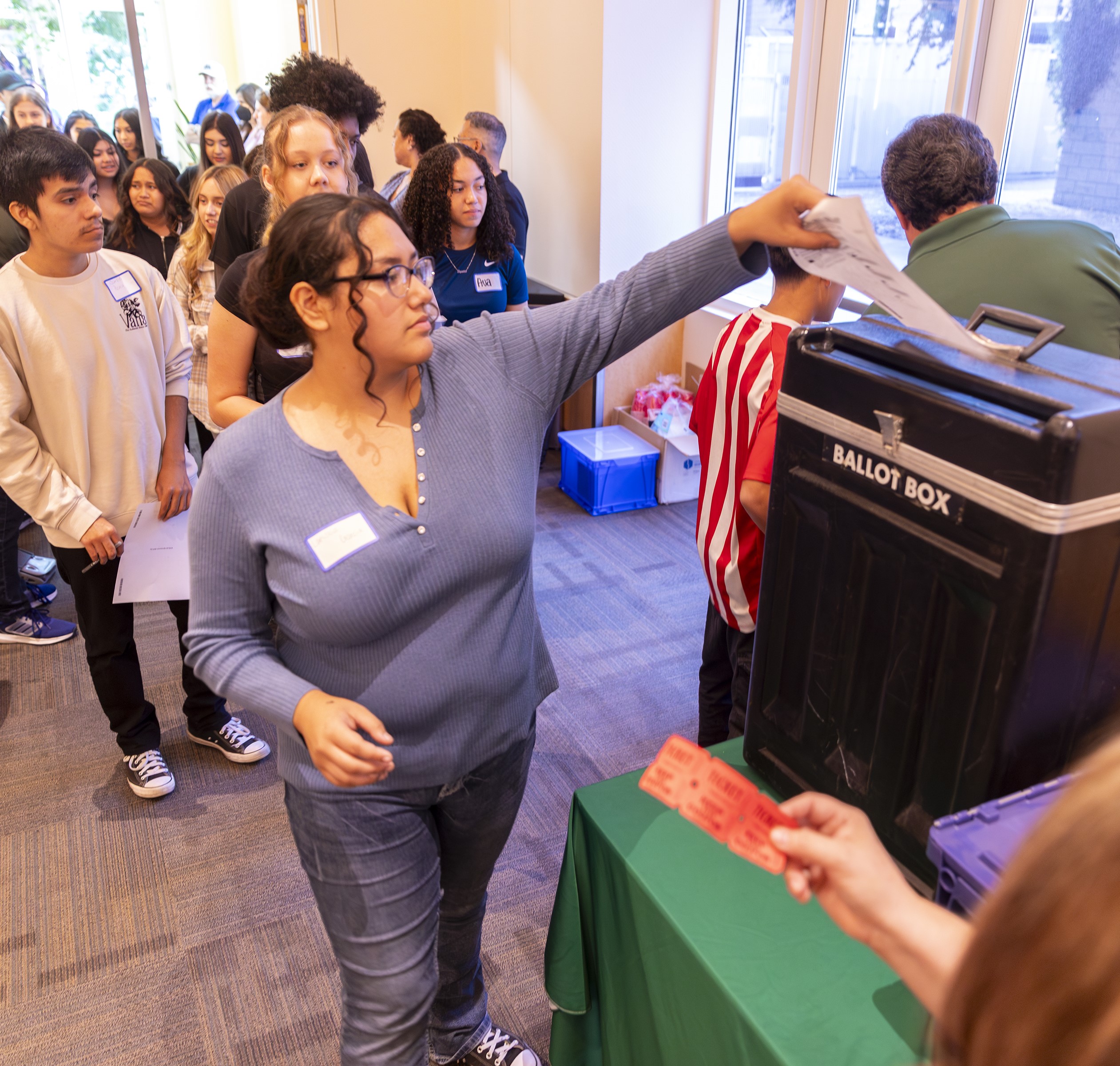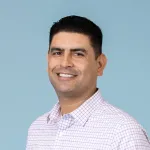
“Changing the Culture” on Voting and Civic Engagement
As the elected assessor, clerk recorder, and registrar of voters for Yolo County, California, Jesse Salinas has a full plate of responsibilities. This year, his office—and 57 others across the state—will play a critical, yet often misunderstood, role in ensuring a successful, inclusive, and safe election for voters.
Since assuming his current role in 2016, Salinas and Yolo County have attracted statewide attention for advancing innovative ideas for increasing voter engagement and participation in elections. He has taken a collaborative approach to working with the communities he serves and has gone the extra mile to provide resources and test new approaches to engaging underrepresented voters. Among the results is a voter turnout rate in the Northern California county that consistently tops the California average. In a reflection of the county’s achievements, innovation, and Salinas’ leadership, he was elected by his peers to head up the California Association of Clerks and Election Officials on July 11, 2024.
The Haas, Jr. Fund is supporting Salinas’s office to build on its innovations in promoting civic engagement, especially among young people, and to partner with trusted community-based organizations on voter outreach and education. In a recent conversation with Haas Jr., Salinas talked about what’s working in Yolo County to make elections fairer and safer, what he’s concerned about as he looks ahead to November, and how funders can best support efforts to strengthen democracy at the local level.
Q: Tell us about your journey to your current role.
Salinas: Starting as an undergraduate, I saw public policy as a whole new field where I could really have an impact on the world. But it wasn’t an easy path. When I was in graduate school, my wife and I relied on the equivalent of today’s WIC (Women, Infants and Children) program to get milk and cheese for our kids. We also relied on the Medi-Cal program when we were expecting our second child. We were living by a thread, but at the same time I am a living example of what happens when people have access to support that can transform their lives.
I also had seen as a child how discrimination affects people’s chances in school and life; I was always being put in certain classrooms because people assumed I couldn’t speak English. It’s those kinds of experiences that led me to public policy and public service, and eventually here to Yolo County. I wanted to help other people transform their lives.
Q: Tell us a little bit about Yolo County.
Salinas: We have rural, suburban, and urban areas and a diverse population that is 44% white, 32% Latino, 15% Asian American and Pacific Islander, and 3% Black. I always tell people that Yolo County is a great laboratory for piloting solutions that could potentially work statewide and even nationally—because if something works here then it’s a good bet it will work in other places on the cusp of those same demographic changes.
Q: What are the voter participation trends in Yolo County?
Salinas: We have seen impressive turnout numbers in recent elections relative to other counties across California. For the 2020 election, turnout was 83% of registered voters, compared to 81% statewide. And in the March primary elections this year, we were 11 percentage points above statewide turnout (46% vs. 35%).
Q: One of your top priorities is engaging young people in voting and civic affairs. What are you learning about what works?
 Salinas: We’re learning you need to get into the schools, and you have to help young people see how public policies and elections affect their lives. We have increased outreach to youth through programs like our Yolo County Youth Civic Initiative, which teaches students about local government and media literacy and other issues. We also have an annual Youth Empowerment Summit (YES!) at UC Davis where students learn about getting involved in the community and local government and elections. And we created a vote center and 24-7 ballot drop box at UC Davis, which ended up getting a national award for the biggest jump in voter turnout among 300 campuses between 2016 and 2020.
Salinas: We’re learning you need to get into the schools, and you have to help young people see how public policies and elections affect their lives. We have increased outreach to youth through programs like our Yolo County Youth Civic Initiative, which teaches students about local government and media literacy and other issues. We also have an annual Youth Empowerment Summit (YES!) at UC Davis where students learn about getting involved in the community and local government and elections. And we created a vote center and 24-7 ballot drop box at UC Davis, which ended up getting a national award for the biggest jump in voter turnout among 300 campuses between 2016 and 2020.
Q: What are you doing to reduce barriers to civic participation and voting for other underrepresented groups?
Salinas: We created a mobile vote center that can go to rural areas and other places where voters might have transportation or language challenges that keep them from voting. Given the large Latino community in the county, we also do a lot of Spanish-language outreach about voting and elections via radio and social media. We’re also focused on tackling language accessibility issues and other accessibility issues that keep folks from voting. It’s a multi-tiered strategy and we’re pleased to see we’re getting results.
Additionally, thanks to support from the Haas, Jr. Fund, and a matching grant from Yolo County, we are working with the local community foundation to provide grants to community-based groups for voter education. The idea is that these organizations are trusted messengers in the community and have a special relationship with local residents, so they are in a great position to share information about when, where, and how to vote.
Q: How can funders do more to support the great work you are doing on these issues?
Salinas: We have a lot of good prototypes we are working on that show real promise for increasing voter engagement and participation, especially in communities with historically low levels of voting. Where we need more support is in capturing what we are learning from these initiatives and sharing that information with other places. We also want to create good materials and curricula that can be expanded and tested in Yolo County and elsewhere to improve civic education in schools. We’re seeing great data on the effectiveness of these programs, and we need more partners to help us share our story.
